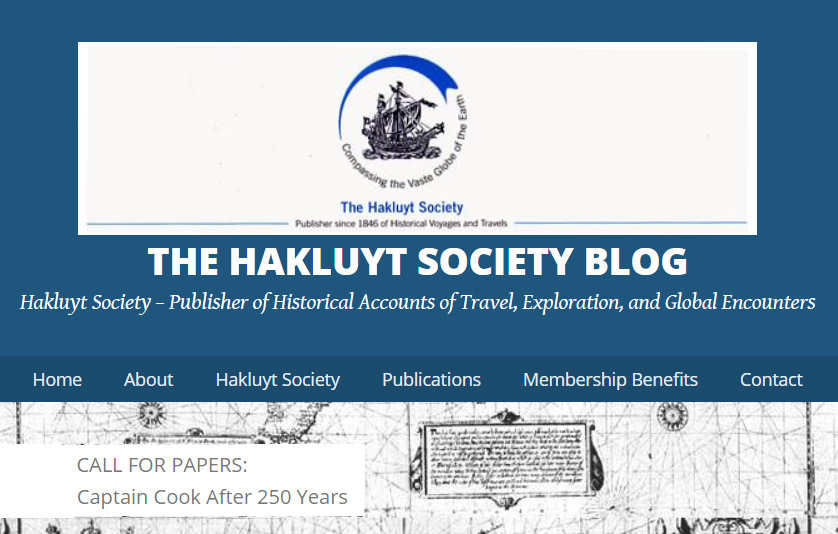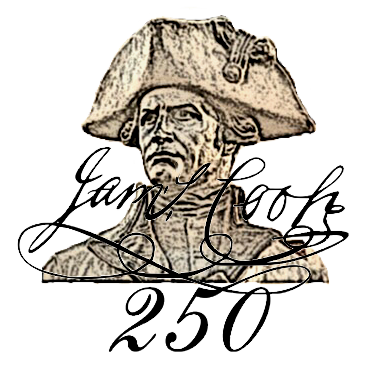
‘Captain Cook after 250 years: Re-exploring The Voyages of James Cook’
An International Conference on Captain James Cook’s voyages (1768-1779)
Organised by the SELVA, the Hakluyt Society, HDEA and VALE, supported by LARCA
7-8 February 2020
Sorbonne Université
Call for papers
Welcoming the presence of Captain James Cook’s voyages (1768-1779) on the syllabus for the French competitive exam of the agrégation in 2020, the SELVA (Society for the study of Anglophone travel literature), the Hakluyt Society (editor of primary records of historic voyages, travels and other geographical material), HDEA (Histoire et Dynamique des Espaces Anglophones, EA 4086), and VALE (Voix Anglophones: Littérature et Esthétique, EA 4085) will be organising, with the support of LARCA (UMR 8225, CNRS, University of Paris Dideerot) an international conference to be held at Sorbonne Université on Friday 7 February (all day) and Saturday 8 February (in the morning) 2020, Amphithéâtre Georges Molinié, Maison de la Recherche, rue Serpente, Paris.
The Penguin edition that provides the textbook for the students (James Cook, The Journals, ed. Philip Edwards [1999], Penguin Classics, 2003, 646 p) is based on the four-volume edition of Cook’s Journals published by the Hakluyt Society.
Paper proposals may be on (but are not limited to):
- the link between Cook’s voyages, the discovery of new territories and cartography
- the historical impact of his discoveries; the role and impact of voyages in the construction of the British Empire;
- other exploration travels that took place in the 1770s, such as Joseph Banks’ travels to Iceland through the Hebrides in 1772 or Phipps’ in the Arctic Ocean in 1773. In France, Bougainville went on his world tour in 1766 and published his Voyage autour du monde in 1771.
- the influence of colonial discourses and the economic aims of sea expeditions; the profit-motivated voyages of privateers like Woodes Rogers earlier on in the century (A Cruising Voyage round the World, 1712); the realization that capitalism and mercantilism were only possible by seizing the wealth overseas; the development of overseas commerce;
- the status of voyagers (geographers? scientists? ethnographers? writers?);
- the technological and scientific dimensions of Cook’s expeditions;
- the different kinds of people on board: botanists, naturalists, scientists, artists etc.
- the aesthetic and literary dimensions of Cook’s Journals: for example, William Hodges, an artist on board with James Cook during his second voyage, was the author of a number of drawings and paintings such as A View taken in the Bay of Oaite Peha Otaheite (1773). His productions had to be very accurate as geographical documents, but they also had an aesthetic dimension;
- philosophical developments on the “bon sauvage” in Britain and France (Diderot);
- the reception, translation and edition of Cook’s writings.
An on-line peer-reviewed publication will follow and the articles will have to be submitted very shortly after the conference.
Please send your proposals (title + 15-line summary, preferably in English), along with a short bio-bibliographical note, to Emmanuelle Peraldo (Emmanuelle.PERALDO@univ-cotedazur.fr), Pierre Lurbe (pierrelurbe@gmail.com), and Ladan Niayesh (niayesh@univ-paris-diderot.fr) before Monday 30 September 2019.
Members of the organising and scientific committee:
Jim Bennett, President of the Hakluyt Society;
Emmanuelle Peraldo, Université de Nice, CTEL (EA 6307), President of the SELVA;
Pierre Lurbe, Faculté des Lettres, Sorbonne Université, HDEA (EA 4086), International Representative of the Hakluyt Society for France;
Ladan Niayesh, Université Paris, Diderot LARCA (UMR 5882, CNRS), Hakluyt Society Council Member; Anne-Florence Quaireau, Faculté des Lettres, Sorbonne Université, VALE (EA 4085), Secretary of the SELVA.
Visit The Hakluyt Society Blog
